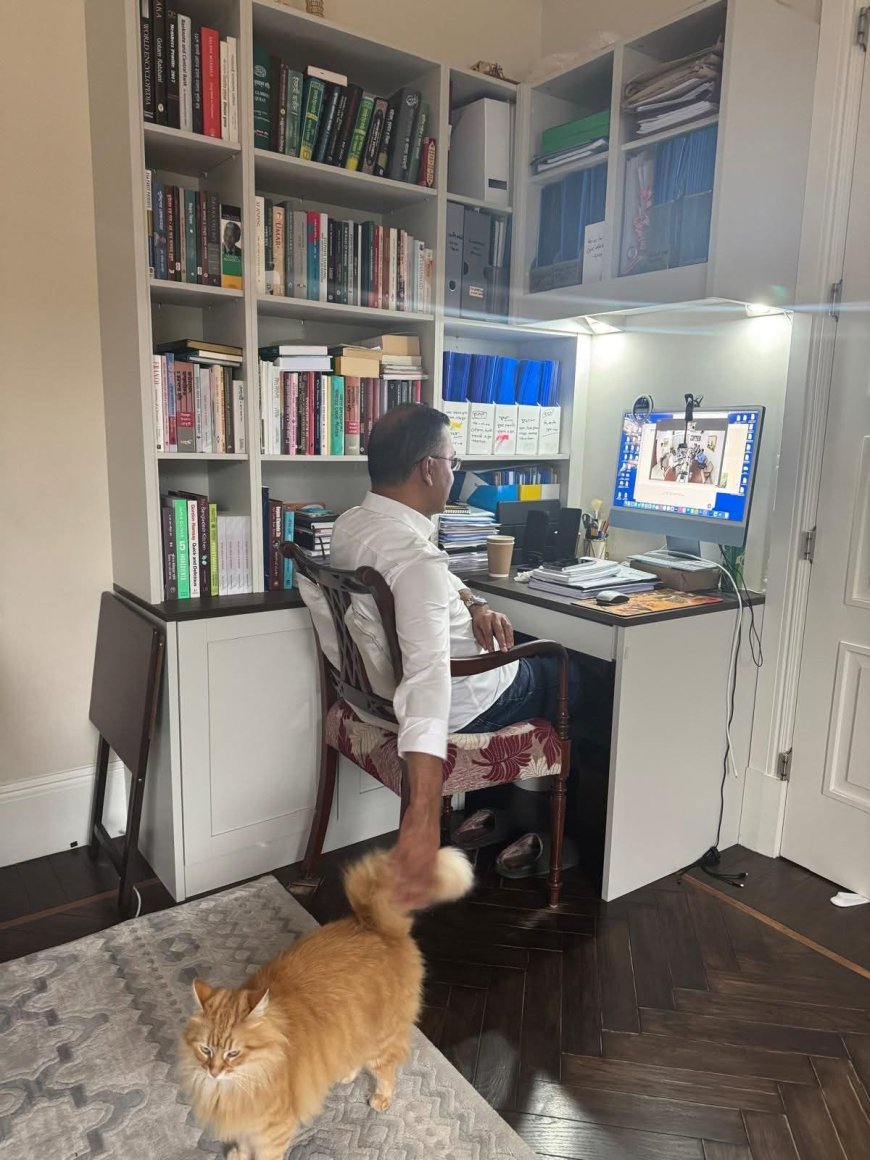The High Stakes of Tarique Rahman’s Political Absence
His prolonged stay in the UK is now the defining issue for the country’s opposition politics. His potential return could reshape public perception, reinvigorate the BNP, and alter the national political equilibrium.

Bangladesh today finds itself in a period of political uncertainty. Following years of turbulence, transitions, and shifting balances of power, the question of leadership has returned to the forefront of national debate.
Among the issues shaping this debate, one stands out with particular urgency: the continued absence of Tarique Rahman, acting chairperson of the BNP, from the country’s political stage. His prolonged stay abroad raises questions not only about his personal political trajectory but also about the structural future of the BNP, the broader opposition movement, and the balance of leadership in Bangladesh.
While the discussion is often framed in terms of loyalty or criticism, it is more constructive to analyze the matter in a broader, neutral light -- examining both the opportunities and risks inherent in his absence, and the implications for Bangladesh’s political system as a whole.
For much of the past two decades, Tarique Rahman’s political reputation was overshadowed by negative portrayals. As the son of former President Ziaur Rahman and former Prime Minister Khaleda Zia, his early career was often described in the language of dynastic succession rather than independent achievement.
Political propaganda and adversarial narratives portrayed him as a symbol of behind-the-scenes maneuvering, particularly linked to the BNP’s power hub known as “Hawa Bhaban.”
Yet over the past year, there has been a noticeable shift in public discourse. His speeches delivered from abroad, his selection of advisors, and his articulation of policy directions have suggested an attempt to project a more mature and reform-oriented image. Living outside Bangladesh for nearly two decades, particularly in a democratic environment like the United Kingdom, appears to have influenced his political rhetoric and strategies.
The significance of this transformation lies less in personal reinvention and more in public perception. Sections of the population, including some critics, have begun to reassess him, acknowledging that his leadership now carries a degree of legitimacy that was previously absent.
However, this legitimacy remains contingent, fragile, and tied to whether he can translate words from exile into political presence on the ground in Bangladesh. At the heart of the debate lies a fundamental principle: politics requires presence. Leaders cannot indefinitely inspire or organize from a distance. In moments of economic strain, social unrest, and political flux, physical absence often begins to overshadow even the most well-crafted statements delivered from abroad.
Bangladesh is currently dealing with several intersecting challenges: economic pressures intensified by global market fluctuations, youth frustration over limited employment opportunities, and heightened concerns about governance, accountability, and the influence of external actors in domestic politics.
Against such a backdrop, the continued absence of a major opposition figure creates a vacuum that is interpreted in varied ways -- prudence by some, hesitation or disengagement by others. Political history, both in Bangladesh and globally, underscores the importance of presence in establishing credibility.
Khaleda Zia, for example, gained legitimacy not solely through her familial connection to Ziaur Rahman but by enduring political hardships, imprisonment, and confrontations that demonstrated resilience.
Similarly, Ziaur Rahman himself became a central figure by stepping into a leadership vacuum during the Liberation War and subsequently consolidating political authority despite severe risks.
These examples illustrate that political credibility in Bangladesh has often been defined through direct confrontation with challenges rather than avoidance of them. If Tarique Rahman continues to remain abroad, there is a risk that he may gradually be perceived less as an active leader and more as a symbolic figurehead invoked by party members. Political movements, being dynamic, tend to adapt to such absences, and leadership vacuums rarely remain unfilled indefinitely.
It is important, however, to acknowledge the counterarguments. Security risks in Bangladesh’s political arena are real and deeply rooted. Political leaders in the country have historically faced imprisonment, assassination attempts, and even death. Tarique Rahman himself has experienced imprisonment and has cited health and security concerns as reasons for remaining abroad. These concerns cannot be dismissed as trivial.
Any decision regarding his potential return must weigh the risks of personal safety and political persecution. At the same time, history also suggests that danger has been an unavoidable feature of political leadership in Bangladesh. The challenge, therefore, is to strike a balance between ensuring personal security and fulfilling the responsibilities of political leadership in a highly contested environment.
Beyond Tarique Rahman’s individual role, the structural challenges facing the BNP deserve equal attention. The party remains one of Bangladesh’s two largest political forces, yet its organizational depth, communication strategies, and youth outreach mechanisms have weakened over time.
The recently concluded Dhaka University Central Students’ Union (DUCSU) election served as an instructive case. The BNP-affiliated student wing, Chhatra Dal, failed to make significant gains, while other groups capitalized on messaging that resonated more effectively with students. Same goes for JUCSU election.
The campaign’s reliance on rhetoric that attempted to delegitimize rivals by invoking historical identity politics backfired, leaving Chhatra Dal vulnerable to comparisons with Islamist groups that appeared more organized and less divisive in their approach.
This outcome reflects broader weaknesses in the BNP’s ability to communicate a coherent political narrative, particularly regarding the Liberation War and the contributions of its founding figures.
In a country where the Liberation War remains the central point of national identity, failing to articulate a clear, evidence-based narrative risks alienating younger generations who expect clarity on historical questions.
The BNP’s limitations are not only narrative-based but also structural. Unlike many modern political parties that rely on think tanks, research cells, and policy institutes, the BNP lacks institutional mechanisms for long-term strategy development. Its politics often appear reactive, responding to immediate developments rather than setting forward-looking agendas.
To regain competitiveness in Bangladesh’s political landscape, the BNP would need to prioritize institutional reform. This includes building research-oriented teams to develop credible policies on pressing issues such as education reform, employment creation, technological innovation, healthcare delivery, and climate resilience.
These issues are particularly important for the younger demographic, which constitutes a majority of the electorate and is increasingly disengaged from politics rooted primarily in legacy disputes.
Media strategy is another critical area. The BNP’s communication often relies heavily on traditional forms of propaganda or reactive statements, which do not effectively reach today’s digital-first audience. A more professionalized media operation -- incorporating data-driven digital campaigns, fact-checking mechanisms, explanatory content, and consistent engagement with citizen concerns -- could help rebuild trust and relevance.
Equally important is the need for leadership development within the party. Youth leaders should be given opportunities not merely as symbolic representatives but as integral participants in shaping policy and communication. Without such restructuring, even the return of Tarique Rahman may not be sufficient to reverse organizational decline.
The absence of visible and credible leadership in Bangladesh carries implications beyond partisan politics. A functioning democracy requires competitive forces that can hold governments accountable, propose alternative policies, and provide citizens with choices.
When major leaders remain abroad or disengaged, the balance of accountability risks weakening, with consequences for governance, economic stability, and international confidence in the country’s political system.
From an economic perspective, uncertainty in political leadership can affect investor confidence, trade negotiations, and the stability of key industries such as garments, remittances, and services.
Diplomatically, the credibility of political alternatives influences how international partners engage with Bangladesh, particularly in areas of trade concessions, labor rights, and climate negotiations.
Thus, Tarique Rahman’s decision on whether to return immediately is not only a personal or party matter; it intersects with broader national interests. His presence, even without immediate electoral success, could inject momentum into political debate, encourage organizational restructuring within the BNP, and compel rivals to adapt to a more competitive landscape.
The critical question is not merely whether Tarique Rahman should return, but how the BNP can position itself as a modern, constructive political force.
Several pathways emerge: developing credible, research-based policies on education, employment, health, and climate; articulating a balanced and evidence-based account of its role in the Liberation War and subsequent decades; investing in professional media strategies suited to the digital age; engaging youth leaders not only as symbolic figures but as substantive policymakers; and restructuring internal accountability mechanisms to reduce reliance on informal patronage networks.
These steps, while challenging, would help position the BNP as more than a party waiting for its leader’s return. They would establish the foundations of a sustainable political movement capable of adapting to the demands of modern governance.
Tarique Rahman’s continued absence from Bangladesh is therefore a defining issue for the country’s opposition politics. His potential return could reshape public perception, reinvigorate the BNP, and alter the national political equilibrium.
The choice he faces is not solely about personal safety or political risk. It is about the future direction of the BNP and, by extension, the competitiveness of Bangladesh’s democracy. At stake is whether the BNP can evolve into a modern, policy-oriented party or whether it remains caught in cycles of reactive politics and reliance on symbolic leadership.
Ultimately, Bangladesh’s political landscape will continue to evolve regardless of individual decisions. But the extent to which Tarique Rahman’s role becomes central or peripheral will depend on how he, and the BNP, respond to this pivotal moment. The stakes are high -- not only for one leader or one party, but for the quality of political competition and governance in Bangladesh itself.
H. M. Nazmul Alam is an Academic, Journalist, and Political Analyst based in Dhaka, Bangladesh. He is currently teaching at IUBAT. He can be reached at [email protected].
What's Your Reaction?














































































